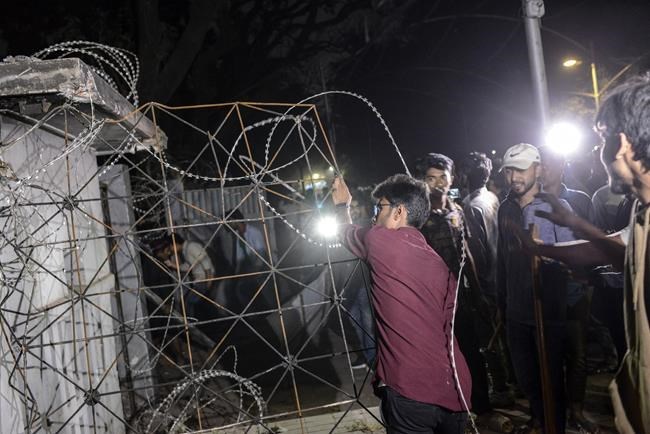
Protesters vandalize the residence of Sheikh Mujibur Rahman, Bangladesh's former leader and the father of the country's ousted Prime Minister Sheikh Hasina, at Dhanmondi, in Dhaka in Dhaka, Bangladesh, Wednesday, Feb. 5, 2025. (AP Photo/Mahmud Hossain Opu)
Republished February 05, 2025 - 6:33 PM
Original Publication Date February 05, 2025 - 12:11 PM
DHAKA, Bangladesh (AP) — Thousands of protesters in Bangladesh took out their anger at exiled former Prime Minister Sheikh Hasina on Wednesday by destroying a family home that came to symbolize the country's independence — and now, they say, the authoritarianism they believe she led.
The attack was sparked by a speech Hasina planned to give to supporters from exile in neighboring India, where she fled last year during a deadly student-led uprising against her 15-year rule. Critics had accused her of suppressing dissent.
The house in the capital, Dhaka, had been home to Hasina's late father and Bangladesh’s independence leader Sheikh Mujibur Rahman, who declared the country's formal break from Pakistan there in 1971. He was assassinated there in 1975. Hasina later turned the home into a museum.
Since she fled the country, some of her supporters have tried to gather there but have been attacked by Hasina's critics, who have attacked other symbols of her government and party since the uprising, ransacking and setting fires in several buildings.
On Wednesday, some protesters threatened to “bulldoze” the building if the former prime minister went ahead with her speech, which marked the start of a monthlong protest program by her Awami League political party. The party is trying to gain support amid allegations of attacks on its members and other Hasina backers.
As Hasina began speaking, protesters stormed the house and started dismantling the brick walls, later bringing a crane and an excavator to demolish the building.
“They do not have the power to destroy the country’s independence with bulldozers. They may destroy a building, but they won’t be able to erase the history,” Hasina said in response during her speech, even as the demolition continued.
She also called on the people of Bangladesh to resist the country's new leaders and alleged that they took power by “unconstitutional” means.
Hasnat Abdullah, a student leader, had warned media outlets against Hasina’s speech and announced on Facebook that “tonight Bangladesh will be freed from the pilgrimage site of fascism.”
Many of the protesters chanted slogans demanding Hasina's execution for hundreds of deaths during last year's uprising against her. It was some of the country's worst upheaval since independence. Hasina urged a U.N. investigation into the deaths.
They also chanted slogans criticizing India. An interim government in Bangladesh led by Nobel Peace laureate Muhammad Yunus has sought Hasina's extradition but India has not responded.
The country’s leading English-language Daily Star reported early Thursday that a wave of attacks overnight targeted several houses and businesses belonging to Hasina’s Awami League supporters.
The interim government, which has been struggling to maintain order and prevent mob justice against Hasina's supporters, has accused the former prime minister of widespread corruption and human rights abuses during her rule that began in 2009.
Hasina's Awami League in turn has accused the Yunus-led government of violating human rights and suppressing Bangladesh's minority groups, which authorities have denied.
While New York-based Human Rights Watch has hailed the interim government's reforms measures, it cited “a disturbing pattern of security force abuses” that has reemerged after Hasina’s ouster, this time targeting Awami League supporters, including journalists.
In a new report last month, the group said that police are again arbitrarily detaining people and filing mass criminal complaints against unnamed individuals, which allows the police to intimidate and threaten virtually anyone with arrest.
News from © The Associated Press, 2025